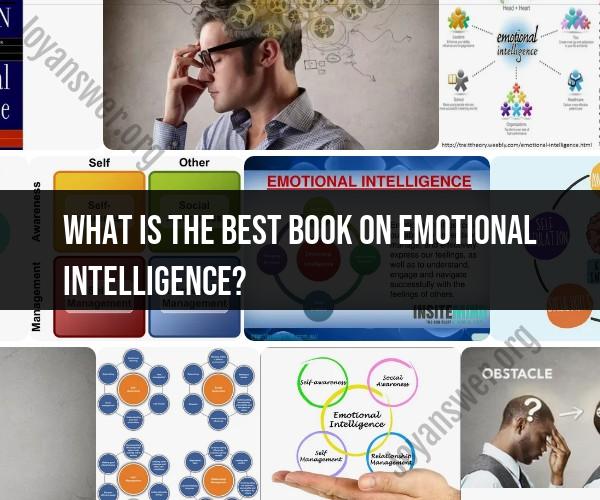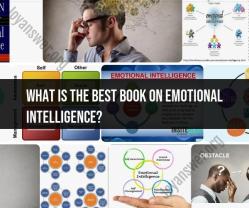What is the best book on emotional intelligence?
Emotional intelligence (EQ) is a critical skill for personal and professional success, and there are several excellent books that explore this topic in-depth. The best book on emotional intelligence for you may depend on your specific interests and needs. Here are some highly recommended books on emotional intelligence, each offering a unique perspective and valuable insights:
"Emotional Intelligence" by Daniel Goleman: This book is often considered the classic work on emotional intelligence. Goleman explores the five key components of emotional intelligence and how they can be applied to various aspects of life, from relationships to leadership.
"Emotional Intelligence 2.0" by Travis Bradberry and Jean Greaves: This book provides a practical approach to improving emotional intelligence. It includes a self-assessment tool and strategies for enhancing your EQ in both personal and professional settings.
"Daring Greatly" by Brené Brown: While not exclusively about emotional intelligence, Brown's book explores vulnerability and shame, which are essential components of emotional intelligence. It delves into the power of vulnerability in personal and professional growth.
"The Language of Emotional Intelligence" by Jeanne Segal and Jaelline Jaffe: This book focuses on communication skills and how they relate to emotional intelligence. It offers practical guidance for improving emotional awareness and interpersonal relationships.
"Leadership: The Power of Emotional Intelligence" by Daniel Goleman: In this book, Goleman delves into how emotional intelligence can be harnessed for effective leadership. He discusses the role of EQ in leadership success and offers strategies for developing leadership skills.
"The EQ Edge" by Steven J. Stein and Howard E. Book: This comprehensive guide explores emotional intelligence and its applications in various aspects of life, including relationships, leadership, and personal development.
"Primal Leadership" by Daniel Goleman, Richard Boyatzis, and Annie McKee: This book examines the connection between emotional intelligence and leadership effectiveness. It emphasizes the impact of leadership's emotional tone on an organization.
"Emotional Intelligence for Dummies" by Steven J. Stein: Part of the "For Dummies" series, this book provides a beginner-friendly introduction to emotional intelligence, offering practical advice and exercises.
"The Emotionally Intelligent Manager" by David R. Caruso and Peter Salovey: This book is tailored for managers and leaders, providing insights into how emotional intelligence can be applied to leadership roles.
"Altered Traits" by Daniel Goleman and Richard J. Davidson: While not solely about emotional intelligence, this book delves into the science of mindfulness and meditation and how they can enhance emotional intelligence and overall well-being.
The best book for you will depend on your specific goals and interests. Some books focus on personal development, while others emphasize leadership, communication, or mindfulness. It may be helpful to choose a book that aligns with your particular areas of interest or professional needs.
The Best Books on Emotional Intelligence: Recommendations
Here are some of the best books on emotional intelligence:
- Emotional Intelligence: Why It Can Matter More Than IQ by Daniel Goleman
- Emotional Intelligence 2.0 by Travis Bradberry and Jean Greaves
- Dare to Lead by Brené Brown
- The EQ Difference by Adele B. Lynn
- Leadership: The Power of Emotional Intelligence by Daniel Goleman
- The 7 Habits of Highly Effective People by Stephen R. Covey
- The Language of Emotions by Karla McLaren
- The Emotionally Intelligent Manager by David R. Caruso
- Primal Leadership: Unleashing the Power of Emotional Intelligence by Daniel Goleman, Richard Boyatzis, and Annie McKee
- Working with Emotional Intelligence by Daniel Goleman
These books provide a comprehensive overview of emotional intelligence, including its definition, components, benefits, and how to develop it. They are written in a clear and engaging style, and they offer practical advice that can help you to improve your emotional intelligence and achieve your goals.
Books Exploring Emotional Intelligence Concepts and Skills
The following books explore specific concepts and skills related to emotional intelligence:
- Self-Awareness: The Hidden Driver of Exceptional Performance by Tasha Eurich
- Self-Management: How to Control Your Impulses and Achieve Your Goals by Kelly McGonigal
- Social Awareness: The Power of Empathy and Understanding Others by Michelle Gielan
- Relationship Management: How to Connect with Others and Build Strong Bonds by Rory Gilmartin
These books provide a deeper dive into the four key components of emotional intelligence: self-awareness, self-management, social awareness, and relationship management. They offer practical tips and exercises to help you develop each of these skills.
Self-Help and Personal Growth Literature for Developing EI
The following self-help and personal growth books can help you to develop your emotional intelligence:
- The Gifts of Imperfection by Brené Brown
- Daring Greatly by Brené Brown
- Mindset: The New Psychology of Success by Carol Dweck
- The Power of Habit by Charles Duhigg
- Atomic Habits by James Clear
- The Four Agreements: A Toltec Wisdom Book by Don Miguel Ruiz
These books focus on developing self-knowledge, self-love, and resilience. They can help you to overcome challenges, build healthy relationships, and achieve your full potential.
Expert Authors and Their Contributions to Emotional Intelligence
Many expert authors have made significant contributions to the field of emotional intelligence. Here are a few of the most notable:
- Daniel Goleman: Goleman is a psychologist and author who popularized the concept of emotional intelligence. His book Emotional Intelligence: Why It Can Matter More Than IQ is considered a classic in the field.
- Brené Brown: Brown is a social worker and research professor who studies vulnerability, shame, and resilience. Her books have helped millions of people to understand and embrace their emotions.
- Travis Bradberry and Jean Greaves: Bradberry and Greaves are co-founders of TalentSmart, a global training and consulting company that specializes in emotional intelligence. Their book Emotional Intelligence 2.0 is a practical guide to developing and improving your emotional intelligence.
These authors have written extensively about emotional intelligence and its importance in personal and professional success. Their work has helped to raise awareness of emotional intelligence and to make it more accessible to a wider audience.
Reading and Applying Emotional Intelligence Insights from Books
Reading books about emotional intelligence can be a valuable way to learn about the concept and to develop your own emotional intelligence skills. However, it is important to go beyond simply reading the books and to apply what you learn to your own life.
Here are a few tips for applying emotional intelligence insights from books:
- Identify your strengths and weaknesses. Once you understand your own emotional intelligence strengths and weaknesses, you can start to develop a plan to improve.
- Set specific goals. What specific emotional intelligence skills do you want to develop? Once you have set some goals, you can develop a plan to achieve them.
- Practice regularly. Just like any other skill, emotional intelligence takes practice to develop. Make sure to practice your emotional intelligence skills in all areas of your life, including your personal and professional relationships.
- Seek feedback from others. Ask trusted friends, family members, and colleagues for feedback on your emotional intelligence skills. This feedback can help you to identify areas where you need to improve.
Reading books about emotional intelligence can be a great way to start your journey to developing this important skill. By applying what you learn to your own life, you can improve your emotional intelligence and achieve your personal and professional goals.



